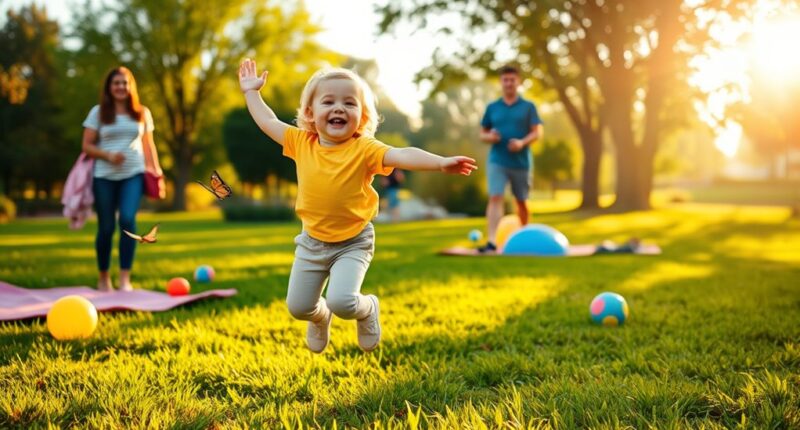Promoting physical activity in toddlers is vital for their growth and development. It strengthens muscles, enhances cognitive skills, and supports emotional well-being. Fun exercises like imitation games, obstacle courses, and dance sessions keep them active while fostering social skills. You can incorporate indoor and outdoor activities to keep their interest high. Keeping exercise enjoyable guarantees toddlers have fun while learning to manage their feelings. Discover more exciting ways to engage your little ones and keep them moving.
Key Takeaways
- Physical activity promotes healthy growth and development, enhancing both physical and cognitive skills in toddlers.
- Engaging in fun exercises like dance, imitation games, and obstacle courses keeps toddlers active and entertained.
- Regular exercise strengthens bones and muscles while establishing lifelong healthy habits for overall well-being.
- Indoor activities like hide-and-seek and outdoor adventures such as playground visits make exercise enjoyable and diverse.
- Safety is crucial; ensure safe play spaces and supervise activities to protect toddlers while they exercise.
Importance of Physical Activity for Toddlers
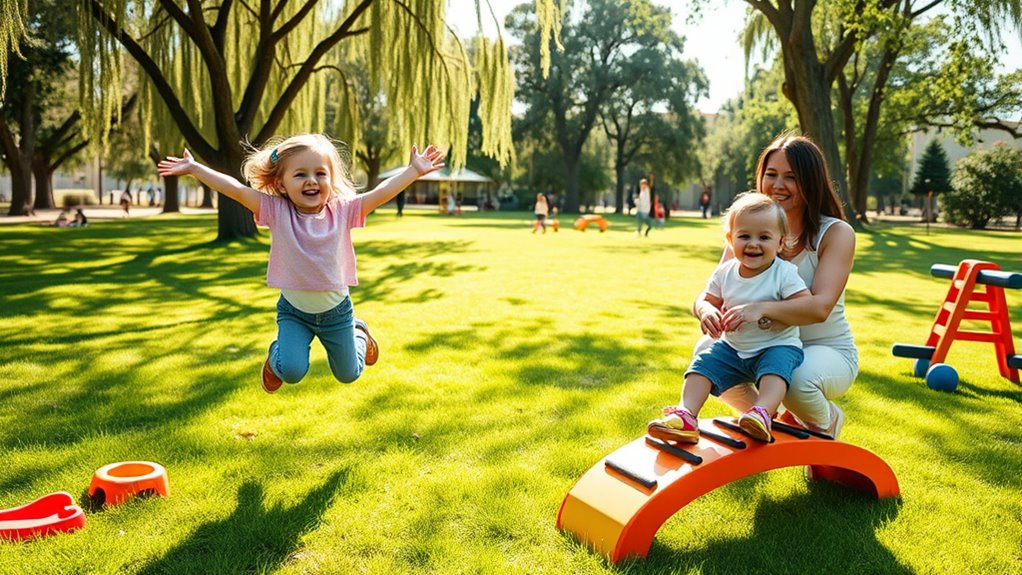
Physical activity is essential for toddlers, as it not only promotes healthy growth but also supports their overall development. Engaging in regular physical activity strengthens their muscles and bones, helping them achieve important developmental milestones. Additionally, silly tantrums often occur, adding humor to their playtime as they explore new movements. Encouraging consistent movement can help foster a strong foundation for lifelong healthy habits. Regular physical activity can also improve cognitive development, helping toddlers learn and retain new information as they grow. Educational toys like Montessori Busy Book can further enhance their learning experiences while they play. You’ll notice improvements in their coordination, balance, and fine motor skills as they explore their surroundings. Additionally, physical activity enhances cognitive development, laying the groundwork for better academic performance later on. It also fosters social skills, promoting cooperation and communication with peers. Furthermore, being active boosts their mood and improves sleep quality, making them happier overall. Regular physical activity can also enhance mental well-being, contributing to a positive emotional outlook as they grow.
Types of Exercises for Toddlers
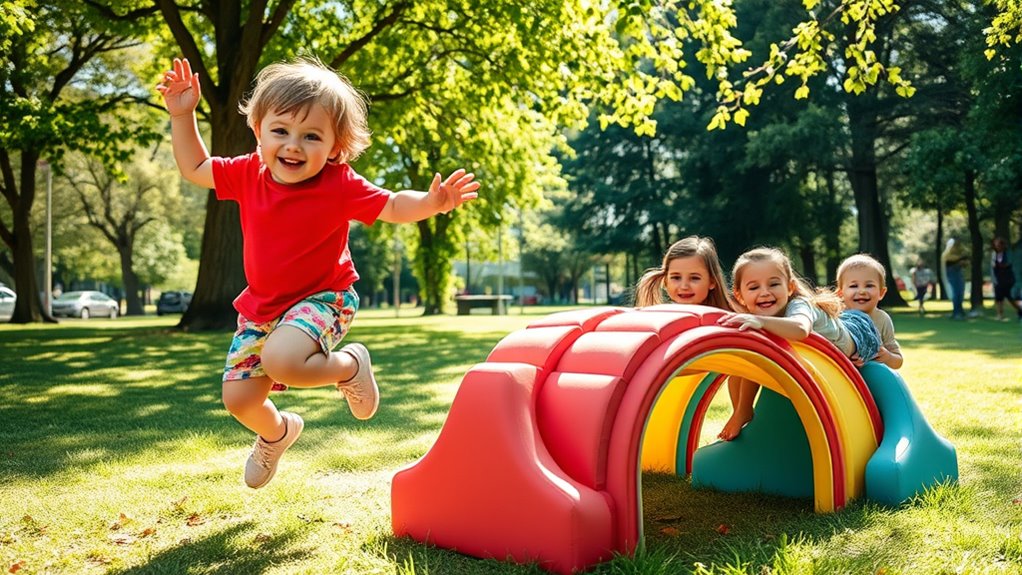
A variety of exercises can keep toddlers engaged and help them develop essential skills. You can introduce imitation games where your child mimics animals, boosting creativity and movement. Additionally, physical activity is crucial for developing motor skills during early childhood. Engaging in regular physical activity can also promote overall health and well-being. Regular outings to parks, where children can interact with diverse environments, can enhance their adaptability and confidence.
Setting up obstacle courses enhances agility and coordination. Soft ball games like throwing or kicking improve gross motor skills, while music and movement activities, like “Follow the Leader,” promote coordination.
Obstacle courses boost agility and coordination, while ball games and music activities enhance gross motor skills and promote coordination.
Outdoor fun at playgrounds encourages climbing and sliding. Nature walks allow for exploration, and bubble play makes running exciting.
You might also try dance sessions or simple yoga poses to improve balance. Equipment-based exercises, like bouncing on therapy balls or riding tricycles, further develop strength and endurance. Engaging in these activities can also foster emotional intelligence and social skills through interactive play.
These activities make exercise enjoyable and beneficial for your little one.
Benefits of Regular Exercise
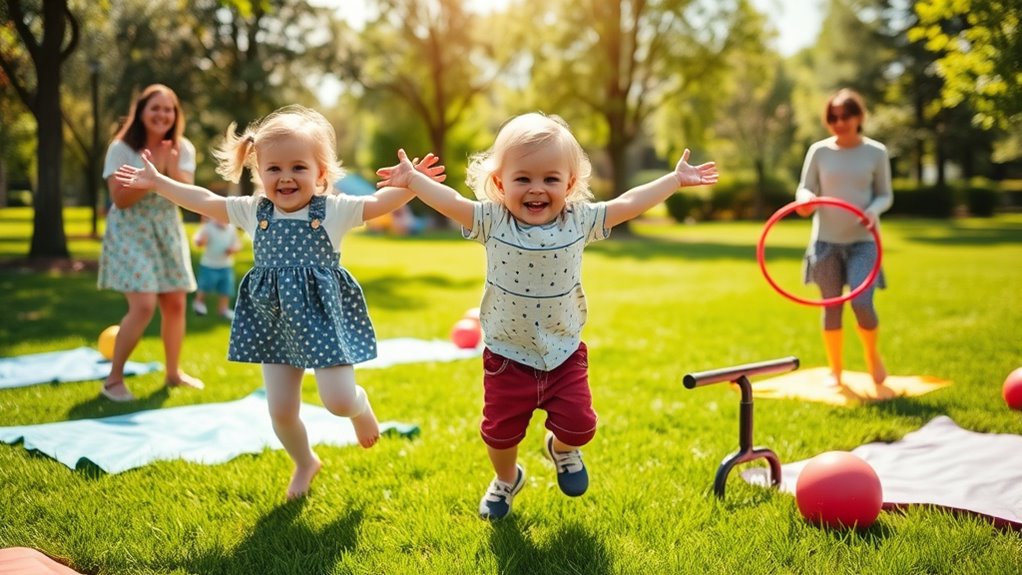
While you might think of exercise as just a way to burn off energy, its benefits for toddlers go far beyond that.
Regular physical activity strengthens bones through weight-bearing activities like running and jumping, while also enhancing muscle development and mobility. It keeps joints flexible and improves posture. Cardiovascular health gets a boost, too, as exercise enhances heart and lung function. Additionally, energy-efficient models can ensure that your home remains a comfortable environment for active play. Engaging in regular exercise can also help establish lifelong habits that contribute to overall health. Moreover, pet therapy has been shown to promote emotional well-being, which can complement the cognitive benefits of physical activity. Including whole foods in your toddler’s diet can further support their energy needs during active play.
You’ll notice cognitive improvements, like better memory and focus, thanks to increased brain health. Plus, physical activity releases endorphins, which lift moods and reduce stress.
Encouraging exercise from a young age fosters lifelong habits, enhances social skills, and strengthens family bonds. In short, regular activity is essential for your toddler’s physical, mental, and emotional well-being. Additionally, promoting exercise can help mitigate issues like ear pressure during colds, which can be exacerbated by sedentary behavior.
Indoor Exercise Ideas
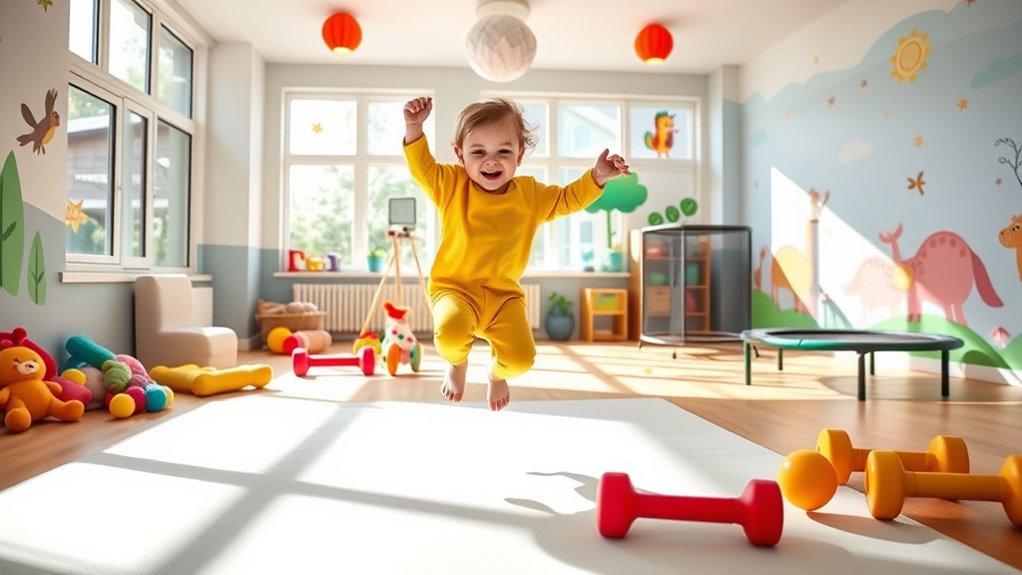
Finding ways to keep your toddler active indoors can be a fun challenge. Try playing hide-and-seek; it encourages movement and exploration. Incorporating light and healthy meals can also promote energy for active play. Additionally, engaging in mindfulness practices can help your toddler stay focused and enhance their enjoyment during physical activities. Physical activity is crucial for overall wellness, as it helps develop motor skills and promotes a healthy lifestyle. Establishing consistent routines can further support the development of healthy habits in young children.
Dance parties are another great option—just crank up the music and let them groove! You could also set up an indoor obstacle course using household items or create a peek-a-boo game in a box. For a lively chasing activity, engage in catch-me-if-you-can. Incorporate simple objects like hula hoops for balance games or action dice for interactive challenges.
Crank up the music for a dance party or craft an indoor obstacle course for endless fun and movement!
Climbing stairs can build leg strength, while rolling on the floor enhances gross motor skills. Don’t forget imaginative play—animal imitation and treasure hunts combine fun with physical activity, keeping your toddler entertained and active indoors! Consider incorporating simple outdoor activities which can also be adapted for indoor play.
Outdoor Exercise Ideas
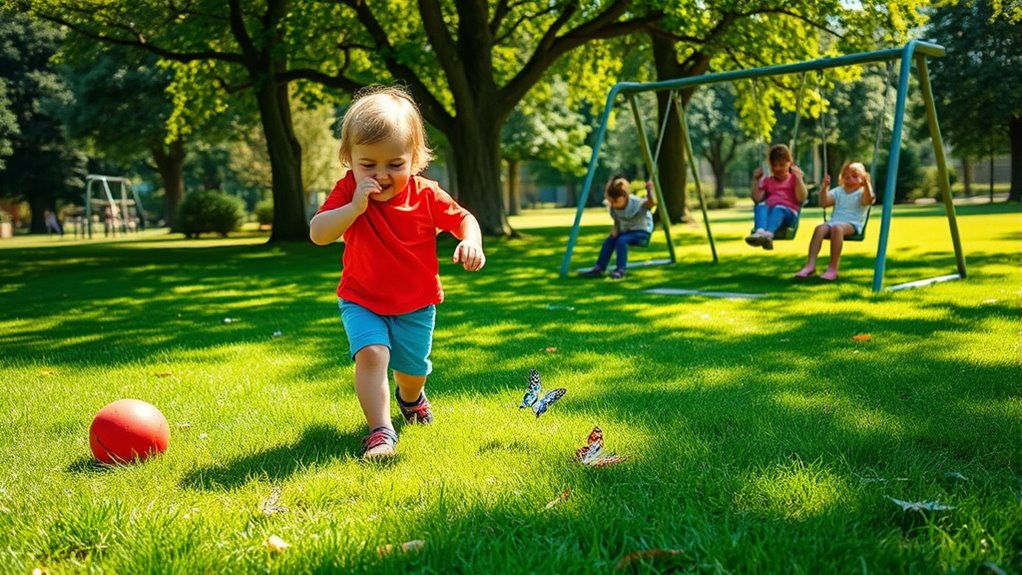
Taking your toddler outside for exercise can turn playtime into a delightful adventure filled with movement and exploration.
Visit the playground and encourage your little one to climb the monkey bars or tackle the balance beams for a fun workout. Set up an obstacle course using playground equipment to keep things exciting.
Nature offers endless opportunities too; try a scavenger hunt or a hike to discover new sights. For water fun, engage in water balloon fights or jump through sprinklers.
You can also play active games like frisbee toss or leapfrog to boost coordination. Don’t forget creative play like dancing with bubbles or crawling through tunnels to make exercise enjoyable and engaging for your toddler. Additionally, exploring water sources during your outdoor adventures can enhance your toddler’s understanding of nature.
Incorporating Exercise Into Daily Routines

Incorporating exercise into your toddler’s daily routine not only promotes their physical health but also enhances their overall development. Aim for at least 180 minutes of physical activity each day, blending structured and unstructured play. Regular outdoor play can also help improve motor skills as toddlers explore their environment.
Create a balanced schedule that includes time for both outdoor adventures and indoor activities, ensuring toddlers remain engaged. Active shifts, like dancing between tasks, keep them moving throughout the day.
Family involvement is essential; participate in activities to set a positive example. You can even set up simple obstacle courses at home to encourage active play. Additionally, engaging in physical activity supports emotional regulation and helps toddlers learn to manage their feelings effectively.
Making Exercise Fun for Toddlers

Making exercise enjoyable for toddlers is vital, as it helps them develop a lifelong love for physical activity.
You can incorporate fun activities like animal imitation, where they hop like frogs or waddle like penguins. Ball play, like rolling and tossing, builds coordination while chasing bubbles adds excitement to their movement.
Setting up obstacle courses fosters creativity and gross motor skills. Engage them in tag games for speed and agility, or dance to music to enhance rhythm.
Superhero adventures and pretend play can spark their imagination while keeping them active. Just guarantee safe play spaces and supervise outdoor activities.
With these playful approaches, you’ll create a positive environment that encourages your toddler to move and explore.
Frequently Asked Questions
How Can I Track My Toddler’s Physical Activity Progress?
You can track your toddler’s physical activity progress using various methods.
Consider using accelerometers for precise movement data or heart rate monitors to gauge intensity. Pedometers are simple for counting steps, while direct observation gives you insights into their activities.
Incorporate technology like fitness trackers or interactive apps that encourage movement. Regularly engage with your child’s playtime, noting changes in their energy levels and skills as they explore different activities.
What Safety Precautions Should I Consider During Toddler Exercise?
When considering safety precautions during toddler exercise, guarantee you provide a spacious and hazard-free environment.
Keep sharp objects and electrical cords out of reach. Regularly inspect play equipment for damage and use safety devices where necessary.
Encourage hydration and monitor your child for signs of fatigue. Supervise closely to prevent accidents, and engage them in age-appropriate activities that promote skill development while modeling safe behavior to reinforce good habits.
How Do I Encourage a Reluctant Toddler to Exercise?
To encourage a reluctant toddler to exercise, start by making activities fun and engaging.
Use games that involve movement, like dancing or animal walks, to spark their interest. Incorporate play into daily routines, and limit screen time to promote active play.
Join in the fun yourself—your enthusiasm can be contagious! Offer praise and celebrate small achievements to boost their confidence, turning exercise into a positive experience rather than a chore.
Are There Any Specific Exercises for Toddlers With Special Needs?
Think of exercise as a fun treasure hunt for your toddler!
For toddlers with special needs, you can use activities like obstacle courses with soft cushions and tunnels, or bear crawls to enhance coordination.
Swimming offers a gentle way to stay active, while trampoline play boosts motor skills.
Balance exercises on therapy balls can strengthen their core.
Tailoring these activities to your child’s abilities makes movement enjoyable and engaging, encouraging them to participate wholeheartedly!
What Are the Signs of Overexertion in Toddlers During Physical Activity?
When you’re observing toddlers during physical activity, look for signs of overexertion.
You might notice irritability or tiredness, along with a rapid heartbeat and excessive sweating. If they seem disengaged or have slowed reflexes, it’s a good indicator they need a break.
Also, watch for muscle soreness and rapid breathing. Keeping an eye on these signs can help guarantee they enjoy their playtime without pushing themselves too hard.
Conclusion
Incorporating exercise into your toddler’s routine is like planting seeds in a garden; with care and creativity, they’ll blossom into active, joyful little ones. By making physical activity fun and engaging, you’ll nurture their love for movement, helping them grow strong and healthy. Whether you’re dancing in the living room or exploring a park, every step counts. So let the adventure begin and watch as your toddler flourishes, discovering the joy of being active every day!
